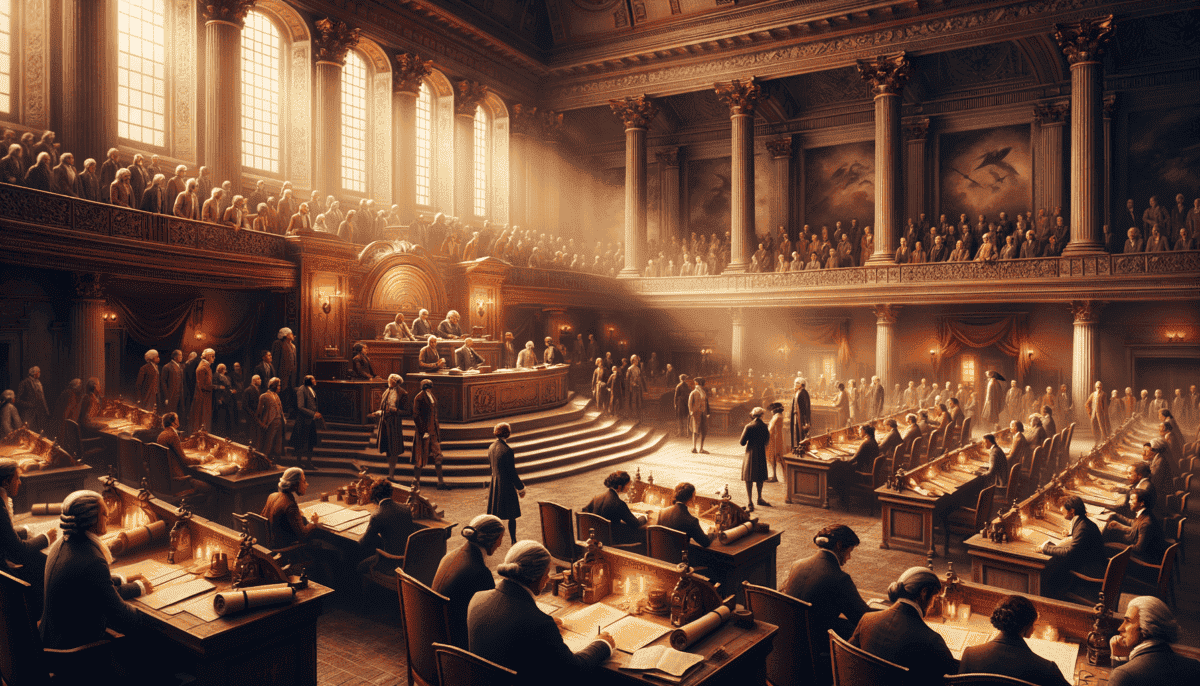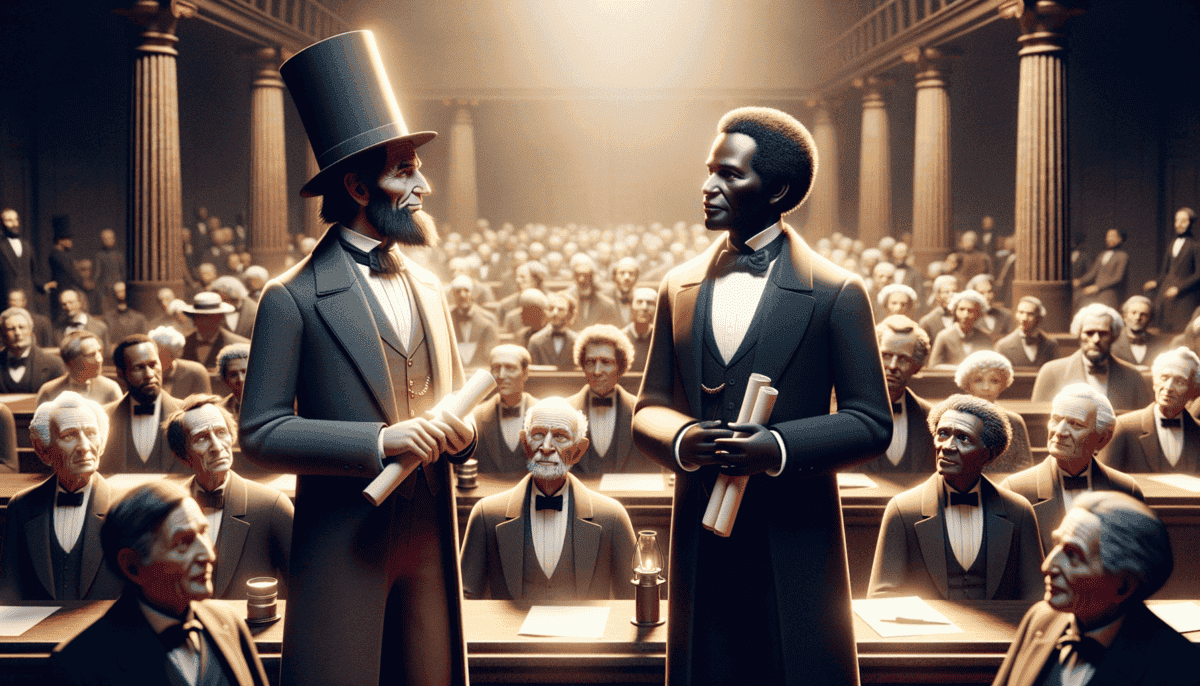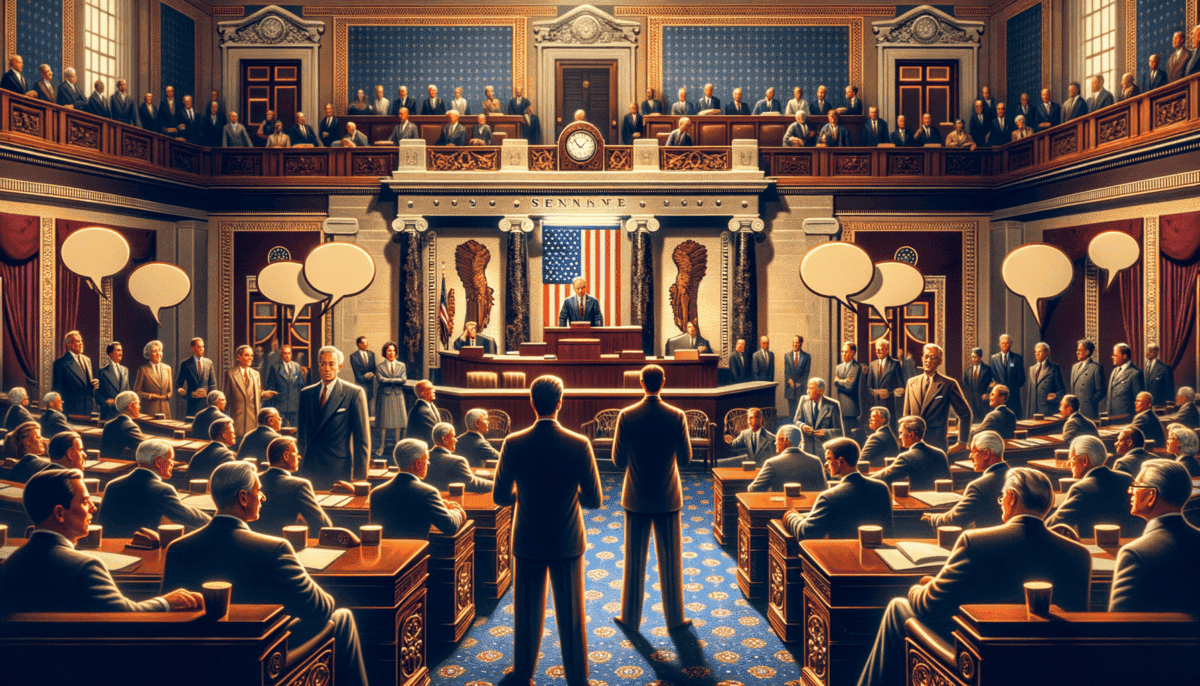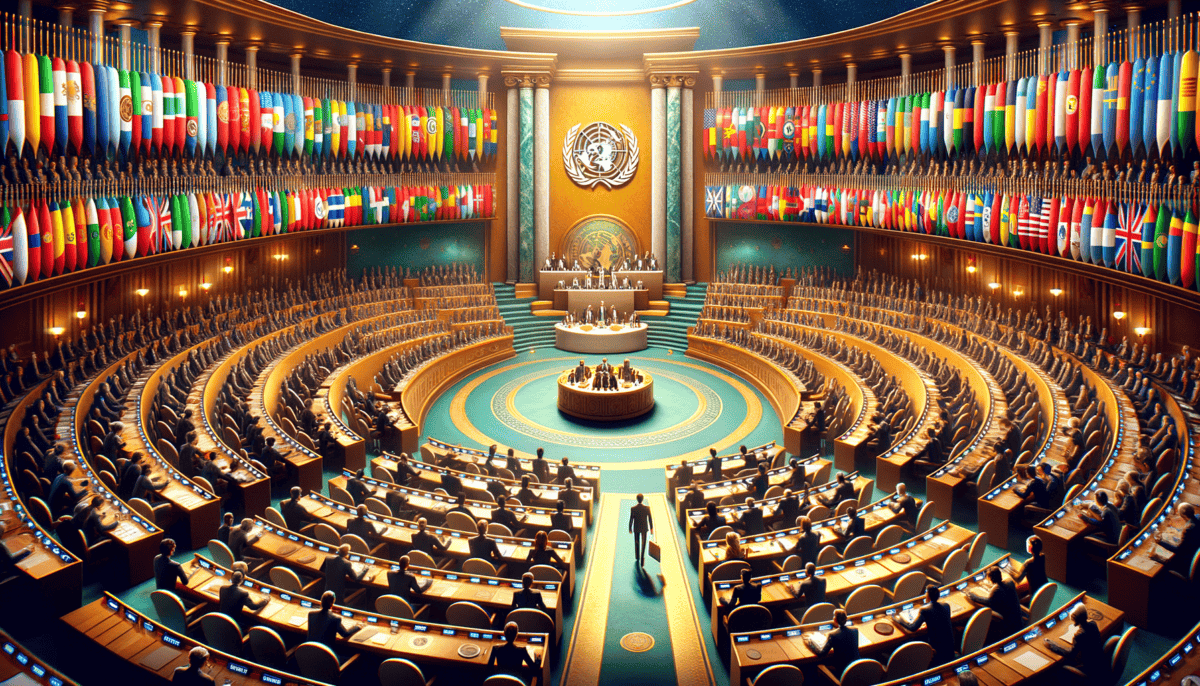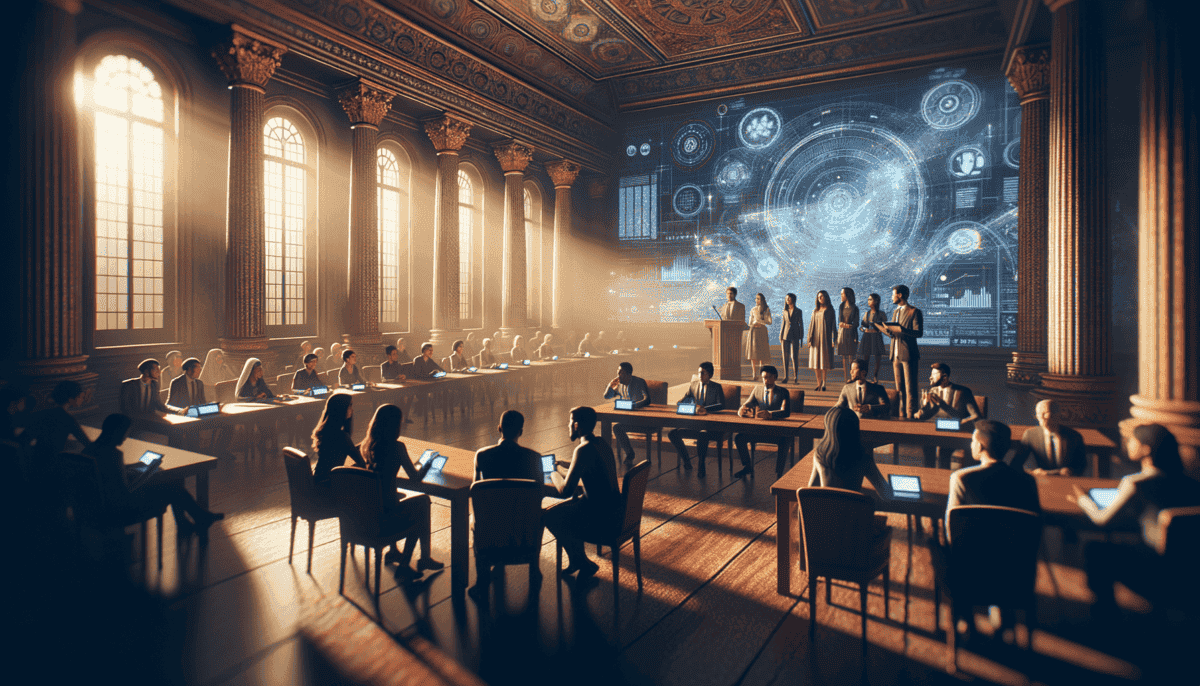The Ancient Seeds of Debate
The marble steps gleamed in the bright Roman sun. Marcus, a young boy of twelve, stood at the bottom of the grand Senate building. His father, Senator Claudius, held his hand tightly. ️
"Today, my son, you will see how words can change the world," Claudius said with a smile.
Marcus had never been inside the Senate before. His eyes grew wide as they walked through the tall doors. The room was huge! Round columns reached up to the sky, and men in white togas sat in curved rows.
A Special Day in Rome
"Look there!" Claudius pointed to the center of the room. "That's where senators speak to share their ideas."
Marcus watched as an old senator named Cato stepped into the speaking area. His voice boomed through the chamber:
“Friends, Romans, we must protect our farmers! Without them, our great city cannot eat!”
Other senators nodded and clapped. Some stood up to speak too. Marcus noticed how they used their hands when they talked, making big movements to show they felt strongly about their ideas.
The Power of Words
"Father," Marcus whispered, "why do they talk so much instead of just deciding things quickly?"
Claudius knelt beside his son. "Because, Marcus, in Rome we believe the best choices come from listening to many voices. When we talk and share ideas, we can find better answers together."
Marcus watched as two senators disagreed about building a new road. But instead of fighting, they:
• Listened to each other carefully
• Used facts to support their ideas
• Spoke with respect, even when they disagreed
• Found a solution that made both sides happy
A Lesson for Life
As the sun began to set, Marcus and his father walked home. The boy's head was full of the day's excitement.
"What did you learn today?" Claudius asked.
Marcus thought for a moment. "I learned that words can be more powerful than swords," he said proudly.
His father beamed. "Yes! And do you know what makes words so special? They can change minds without hurting anyone. That's why we debate in the Senate."
That night, Marcus couldn't sleep. He kept thinking about the senators and their powerful speeches. Maybe someday, he thought, he would stand in that great room and use his own words to help make Rome even better.
Later, when Marcus became a senator himself, he remembered that first day in the Senate. He never forgot how words could build bridges between people and help them work together to solve big problems.
The Roman Senate's way of talking and listening to different ideas didn't just help Rome. It showed people all over the world how to make decisions together. Even today, thousands of years later, we still use many of the same ways of talking and listening when we make important choices for our countries.
Shaping a New Nation
The room was hot and stuffy in Philadelphia. It was summer, 1787. Benjamin Franklin wiped sweat from his forehead as he watched his friend James Madison step up to speak.
“Friends,” Madison said, “we are here to build something new. A government that listens to all its people.”
A Big Meeting About Big Ideas
The Constitutional Convention was like a giant classroom where America’s leaders came to share ideas. They met in Independence Hall, a beautiful brick building with tall windows.
Alexander Hamilton stood up next. He was younger than most others there, but he spoke with fire in his voice:
“We need a strong government to protect our freedom. But not so strong that it can hurt our rights!”
Different States, Different Ideas
Not everyone agreed on how to build this new country. Some wanted big states to have more power. Others fought for small states to have an equal say.
“It’s like sharing a pie,” explained Franklin to a young helper. “Everyone wants their fair slice.”
The main things they talked about were:
• How to choose a president
• What rights people should have
• How to make laws fair for everyone
• How states should work together
Finding Ways to Agree
Sometimes the room got very loud. People would argue and shake their fists. But then something amazing would happen – they would listen to each other and try to find answers together.
Writing It All Down
As summer turned to fall, the men wrote down all their best ideas. This became our Constitution – the rules for how America would work.
“What we do here,” Madison said, “will help people for hundreds of years.”
George Washington nodded. “Yes, and it will show the world that people can rule themselves if they work together.”
A New Way Forward
When the Constitution was finally done, Benjamin Franklin looked at the sun painted on the back of Washington’s chair.
“I have often looked at that sun,” he said with a smile, “wondering if it was rising or setting. Now I know it is a rising sun, just like our new nation.”
The way these brave leaders talked and worked together showed something important: when people share ideas and listen to each other, they can build amazing things. Their words and wisdom still help us today as we work to make our country better for everyone.
The hot Philadelphia summer had changed America forever. But more importantly, it showed how talking and listening could help people solve their biggest problems.
Words That Broke Chains
The year was 1852. A tall man named Frederick Douglass walked to the front of a big room in Rochester, New York. His eyes were bright and strong. ️
“What does the Fourth of July mean to a slave?” he asked. The room got very quiet.
A Voice for Freedom
Frederick Douglass knew about slavery because he used to be a slave. Now he was free, and he used his voice to help others. His words were like thunder – they made people listen.
“We cannot be quiet,” Douglass said. “Not when millions of people are not free.”
Big Words, Big Changes
In the Senate, people were fighting about slavery too. Some said it was wrong. Others wanted to keep it. The talks got very heated.
“A house divided against itself cannot stand,” Abraham Lincoln said. “America cannot be half free and half slave.”
Lincoln was good at explaining hard things in simple ways. He helped people understand why slavery had to end.
Speaking Up for What’s Right
Important ways people fought slavery with words:
• Making speeches in towns and cities
• Writing stories in newspapers
• Talking in Congress
• Sharing true stories about slavery
More and more people started listening. They began to see that slavery was wrong.
Brave Speakers
Charles Sumner was a senator who spoke against slavery. One day, he gave a big speech that made some people very angry. They hurt him, but he didn’t stop fighting for what was right.
“Truth is strong,” he said after he got better. “It will win in the end.”
The Power of Stories
Harriet Beecher Stowe wrote a book called “Uncle Tom’s Cabin.” It told stories about slave families. Many people cried when they read it.
“Now I understand,” people would say. “This must stop.”
Words Lead to Action
All these brave speakers and writers helped change America. Their words were like seeds that grew into freedom.
When Lincoln finally wrote the Emancipation Proclamation to free the slaves, he used many of the same words and ideas these speakers had shared.
“This paper means more than just words,” Lincoln said. “It means freedom for all.”
The fight wasn’t over, but something big had changed. People had learned that speaking up for what’s right could change the world. Words had helped break chains that metal could not.
Standing Up for Equal Rights
The sun was bright in Washington D.C. on June 10, 1964. Inside the big Senate building, something important was happening. ️
A Long Talk About Rights
Senator Hubert Humphrey stood up. His heart was beating fast. He had been talking for 14 hours about why all Americans should have equal rights.
“Every American,” he said, “should be able to eat at any restaurant, go to any school, and work at any job they want.”
Brave People Speaking Up
Many people helped fight for civil rights in the Senate:
• They made long speeches
• They told true stories about unfair treatment
• They worked together to make new laws
• They didn’t give up when things got hard
Dr. Martin Luther King Jr. came to Washington too. He talked to the senators about his dream for America.
“We want all children to play together and learn together,” he said. “That’s what America should be.”
Making Friends to Make Change
Senator Mike Mansfield was smart. He knew they needed more friends to help pass the new laws. He talked to other senators every day.
“Let’s work together,” he would say. “This is about doing what’s right.”
Stories That Changed Minds
Senator Philip Hart told stories about black soldiers who fought in wars for America. “They helped protect our country,” he said. “Now we need to protect their rights.”
People in the Senate started listening. More of them wanted to help.
A Big Victory
On July 2, 1964, something amazing happened. The Civil Rights Act became a law!
President Lyndon Johnson picked up his pen. “America is different now,” he said. “We are going to be fair to everyone.”
More Work to Do
The next year, they passed another important law – the Voting Rights Act. It made sure everyone could vote.
Senator Edward Kennedy smiled. “This is what democracy looks like,” he said. “Everyone gets to have a voice.”
The speeches and debates in the Senate helped change America. They showed that words could open doors and create new paths to freedom. When people speak up for what’s right, good things can happen.
Around the World in Word Power
The United Nations building stands tall in New York City. Inside, people from all over the world come together to talk about big problems.
Different Ways to Talk
Maria watched from the gallery as speakers from many countries took turns at the big microphone. She noticed something interesting – each country had its own special way of talking.
“In my country,” said Mr. Kim from South Korea, “we bow to show respect before we speak. Then we share our ideas calmly.”
Big Problems, Big Talks
Today, they were talking about keeping our Earth clean. Representatives from different places shared their ideas:
• Brazil talked about saving rainforests
• Japan showed new ways to make clean energy
• Kenya shared ideas about saving water
• Germany explained how to make less trash
• India discussed helping poor communities
Working Together
Ms. Singh from India stood up. “The problems we face are too big for one country to solve alone,” she said. “We must work together.”
“When we share ideas, we find better answers,” added Mr. Garcia from Mexico.
Learning from Each Other
In the British Parliament, speakers say “Right Honorable Friend” to be polite. In Australia’s Senate, they use simple words so everyone can understand.
Young Voices Matter
A group of students from Sweden came to speak about climate change. Their leader, Anna, was only 16.
“Young people care about the Earth’s future,” she said. “Please listen to us too.”
Making Changes Together
The UN created special groups where countries could work together. They called them “committees.”
“When we talk and listen,” said Dr. Santos from Brazil, “we find ways to help each other.”
New Tools for Talking
Technology helps people from different countries talk more easily. Video calls let leaders meet without traveling far. Translation computers help people understand each other better.
“The world is like one big family now,” smiled Mrs. Chen from China. “We must take care of each other.”
The day ended with a promise. All the countries agreed to work harder to solve problems together. They showed that even though we speak different languages and come from different places, we can still find ways to help each other and make the world better.
The Future of Talking Together
Maria sat in her classroom, watching a special video screen. Students from all around the world were talking about making their towns better.
New Ways to Share Ideas
“Look!” Maria pointed excitedly. “That’s my friend Yuki from Japan. She’s using a computer that changes her words into English right away!”
Ms. Rodriguez, their teacher, smiled. “Technology is making it easier for everyone to join important talks.”
Kids Making a Difference
“Today, we’re going to have our own little senate,” Ms. Rodriguez announced. “What should we talk about?”
The class had great ideas:
• Making the playground safer
• Starting a school garden
• Helping new students feel welcome
• Recycling better
• Reading to younger kids
Learning Good Talk Rules
“Remember what we learned about good talking and listening,” said Ms. Rodriguez.
“Take turns speaking. Listen carefully. Be kind with your words.”
Everyone Gets a Voice
Tomas, who usually stayed quiet, raised his hand. “I think we should help kids who feel lonely at recess.”
“That’s a wonderful idea!” Maria beamed. “We could start a friendship bench!”
Making Things Better
The class voted to try all their ideas. They made teams and plans. Even the principal came to listen!
“You’re showing us how to make good changes,” the principal said proudly. “Just like the real senate!”
Looking to Tomorrow
After class, Maria thought about everything she’d learned about talking together:
Words can change minds.
Listening helps us grow.
Everyone’s ideas count. ⭐
Working together works better.
A Bright Future
“When I grow up,” Maria told her mom that evening, “I want to help people talk and work together, just like in the senate.”
Her mom hugged her. “The future needs good talkers and good listeners. You’re learning to be both.”
That night, Maria dreamed of a world where everyone talked kindly and listened carefully. Where big problems got solved because people worked together. And where even the smallest voice could make the biggest difference.
And the best part? That world wasn’t just in her dreams – it was growing right now, in classrooms and senates and meeting rooms all around the world, wherever people came together to share their ideas and make things better for everyone.


